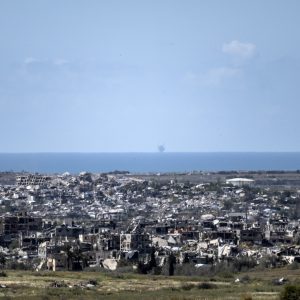With tensions high, UN extends Lebanon peacekeeping force’s mandate
United Nations, United States – AFP
The United Nations Security Council on Wednesday extended the mandate of the UN peacekeeping force in Lebanon for a year, calling for a “de-escalation” of a recent surge in violence between Israel and Hezbollah.
A unanimously adopted resolution said the council “decides to extend the present mandate of UNIFIL until 31st August 2025,” referring to the United Nations Interim Force in Lebanon.
With more than 10,000 personnel, the peacekeeping force has been stationed in Lebanon since 1978, with its role strengthened after a 33-day conflict between Hezbollah and Israel in 2006.
Tensions have risen again since the October start of Israel’s war in Gaza, with Hezbollah supporting the Palestinian armed group Hamas with operations in southern Lebanon, including daily exchanges of fire with Israeli troops.
On Sunday, Hezbollah carried out a major drone and rocket attack against Israel, in retaliation for the death of one of its military leaders, Fuad Shukr, killed in an Israeli strike near Beirut on July 30.
In response, Israel launched air strikes into Lebanon on Sunday, saying it destroyed “thousands” of Hezbollah rocket launchers and thwarted a major attack.
The UN Security Council resolution said the body “strongly urges that all relevant actors implement immediate measures towards de-escalation, including with a view to restoring calm, restraint and stability across the Blue Line,” referring to the demarcation line between Israel and Lebanon.
UN Secretary General Antonio Guterres, in a letter to the council at the end of July, had supported Beirut’s request to extend UNIFIL’s mandate unchanged.
While the mandate has not been amended, the resolution adopted on Wednesday “encourages the Secretary-General to ensure that UNIFIL remains ready to adapt its activities to support de-escalation, within its mandate and its rules of engagement.”
Lebanese Prime Minister Najib Mikati said extending the peacekeeping force’s mandate was “necessary” for “stability in south Lebanon.”
He emphasized “Lebanon’s commitment to work closely with UNIFIL to face the challenges and threats to stability in the south”, a statement from his office said.
Israeli ambassador to the UN Danny Danon, however, criticized what he termed the “failure” of UNIFIL.
“What good does this mandate do when it fails so miserably to meet any of its objectives?” he told reporters.
Danon described a rocket attack that killed 12 children in the Israeli-annexed part of the Syrian Golan Heights at the end of July as “a direct result of the failure of UNIFIL and the Lebanese government to implement” the Security Council’s resolutions.
Danon said the renewal of UNIFIL’s mandate did not address “core problems”, and accused the council of “turning a blind eye to Hezbollah’s massive military build-up.









